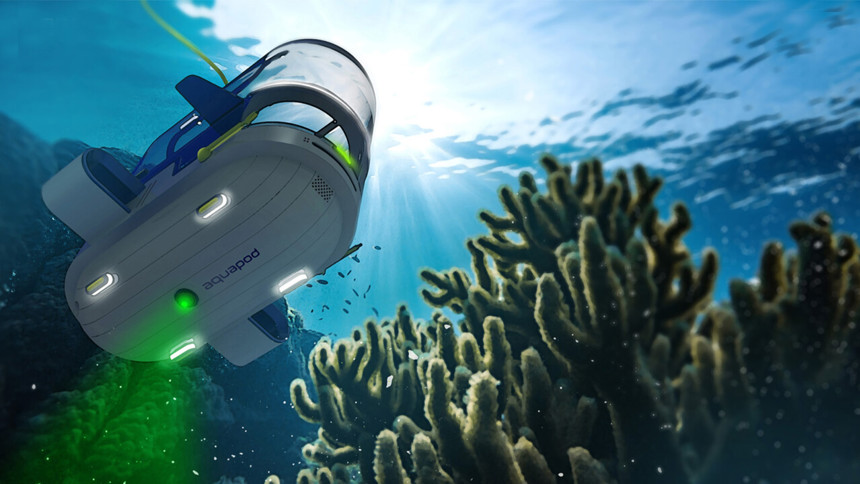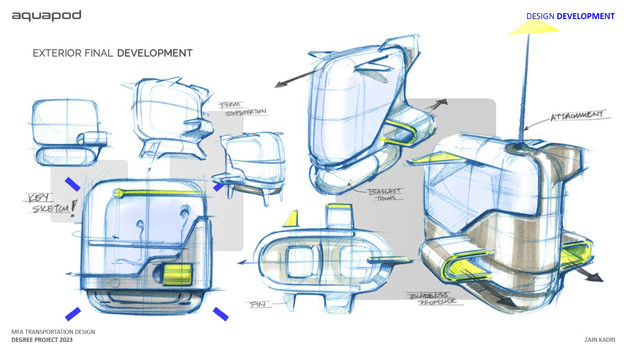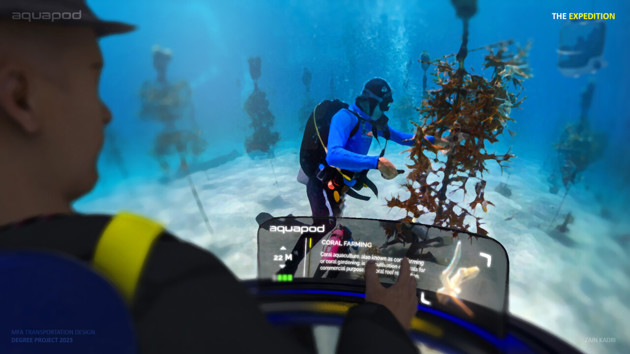Marine tourism reimagined
For his grad project, MFA TD student Zain Kadri created ’Aquapod’, a vision towards sustainable marine tourism in 2030.

Through educational and interactive experiences, Zain is hoping to create awareness around the effects that human activities have had on marine life. The Aquapod is designed to raise the level of ocean literacy, and thus inspire pro-active engagement in the environment.
Hear Zain Kadri, graduate from MFA Transportation Design, talk about ’Aquapod’, his design project for UID23 exploring how we might reimagine marine tourism in a sustainable way.
It allows travellers to embark on an enlightening journey
Zain kadri, MFA Transportation design
“Aquapod is a capsule that descends into the depths of the ocean, where tourists can fully appreciate the beauty of marine life while also learning about, for example, how the bleaching of corals is affecting multiple ecosystems around the globe”, says Zain Kadri.
Saving coral reefs: Embracing inclusive innovation
Coral reefs serve as vital habitats for a significant proportion of marine life, encompassing 25% of all marine species on our planet. Their ecological significance extends far beyond their intrinsic value, as they make substantial contributions to various industries, including medicine, fishing, and marine tourism. However, the very existence of these remarkable ecosystems is now under threat due to a combination of factors such as pollution, overfishing, global warming, climate change, and human activities.

Final design exploration sketches and detail development of the 'Aquapod'.
ImageUmeå Institute of DesignZain Kadri believes that the future of marine tourism hinges upon our ability to embrace inclusive, innovative technologies while demonstrating an unwavering commitment to environmental stewardship.
“With Aquapod, I’ve focused on inclusivity, inviting individuals of all ages and abilities, including those with limited mobility in wheelchairs, to partake in a transformative journey”.
Advancing science and sustainability in marine tourism
The Aquapod itself, derives its energy from a combination of solar panels and wave energy turbines, showcasing a commitment to sustainable practices. The proposed materials for its construction, such as recycled nylon, matrec (a blend of recycled rubber wood and cork), and fiber-reinforced PET (fabric derived from reused products), exemplify an innovative use of materials. This not only enhances the product's longevity but also significantly reduces its carbon footprint.

The 'Aquapod' allows scientists to research the effects of coral farming and its potential advantages for future generations.
ImageUmeå Institute of DesignBeyond its functional aspects, the Aquapod could play a pivotal role in advancing scientific knowledge. The valuable information gathered during each expedition becomes a beneficial resource for oceanographers and marine biologists, fuelling their studies and research.
At its core, Zain’s design concept emphasizes the crucial role we can play in promoting sustainable development and responsible ocean governance.
